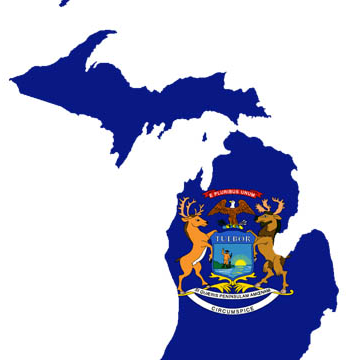
For all the excitement that comes when a state passes online gaming and/or poker regulations, there’s little desire by the public to actually see how the sausage is made, so to speak. Thus, when a lowly committee in a legislative body passes a piece of legislation out of its purveyance, it is usually of little note. With the momentum of recent actions, however, that exact occurrence in the state of Michigan has online poker supporters looking towards next year.
The Michigan House Regulatory Reform Committee recently passed HB 4926, a bill that would regulate the online poker industry in the Wolverine State, by a resounding margin. That committee action pushed the bill forward to the House floor for consideration, but the current legislative session expired before the House could put the bill up for a vote. With a companion bill in the Michigan Senate that also cleared its respective committee earlier in 2017, there are the templates in place for the Michigan Legislature.
HB 4926, sponsored by Representative Brandt Iden, and the Senate bill, sponsored by Senator Mike Kowall, basically would provide for Michigan to open an intrastate online gaming industry, which estimates predict would bring in about $300 million once it is fully operational. That is a huge estimate as even the current online gaming regulations in New Jersey, a state that is similar in size to Michigan, is looking at passing $200 million in revenues in its third full year in existence.
Why the optimism in Michigan? The Legislature seems to be more than welcoming to the idea of allowing its citizens to gamble online, something that has been difficult to convince other states and their elected officials to do. Michigan was one of the states that pushed for online gaming in the individual states when they asked for clarification in 2011 from the U. S. Department of Justice regarding the Wire Act of 1961. That clarification – which came down in a Christmas decision in 2011 that the Wire Act only applied to sports betting – allowed Michigan and a handful of states to move forward with online lottery sales; for Michigan, that has become an $80 million industry as of 2017.
Between Iden and Kowall and their politicking in their respective legislative bodies, there was some hope that their respective bills would pass in the 2017 calendar year, but scheduling didn’t make that possible. That doesn’t spell the end to these efforts, however. In Michigan, a bill can roll over to the next legislative session, whereas in most states any bills presented during a legislative session are “killed” when their sessions end.
It is also a harbinger of the coming year that there is optimism that Michigan may get in the online gaming industry. Since 2013 when three states – Nevada, New Jersey, and Delaware – passed online gaming and/or poker regulations (only Nevada is poker only), there had been a drought of states joining them in the effort. That was until this fall, when a fourth state, Pennsylvania, passed their own online casino gaming regulations for their citizens; it is believed that at some point in 2018 Pennsylvania will go online with their product and there is reason to believe that they would join the gaming compact that has been signed between the Original Three earlier in 2017 (but hasn’t come to life yet).
Further excitement regarding the regulation of online gaming and poker is extending to other states. After dancing for several years on the sidelines, New York is potentially lining up to drive to the finish with online gaming and poker. Other states like Illinois, Massachusetts, Connecticut, and New Hampshire could also get into the online gaming and poker mix. Then there’s always the specter of California, which has been debating online poker regulation for a decade, breaking through their yearly legislative morass and actually pass online poker laws that appease every faction in their complicated state. With the addition of Michigan in this equation, it isn’t out of line to suggest that 2018 has the greatest potential for a sudden surge of regulation regarding the online gaming and poker industry than any other since “Black Friday.”
The path forward in Michigan is a simple one in words. With both bills through committee, they both would have to come for a vote in their respective legislative bodies. If both were to pass, then they would have to go to “reconciliation” to eliminate any differences between them. Once that process is done, they would have to be voted on again by the House and the Senate and, if approved, the bill would go forward to Governor Rick Snyder for his signature (Snyder’s position on the proposed legislation is unknown).
While simple in words, it may not be simple in action. 2018 is an election year and every seat in the Michigan Legislature is up for re-election. Facing the voters is one of the quickest ways for an elected official to change their mind on certain legislation to appease a segment of the voting bloc. An issue such as gaming is one that could very well change a mind of an elected official, perhaps to the point of stopping forward movement of legislation such as HB 4926.















